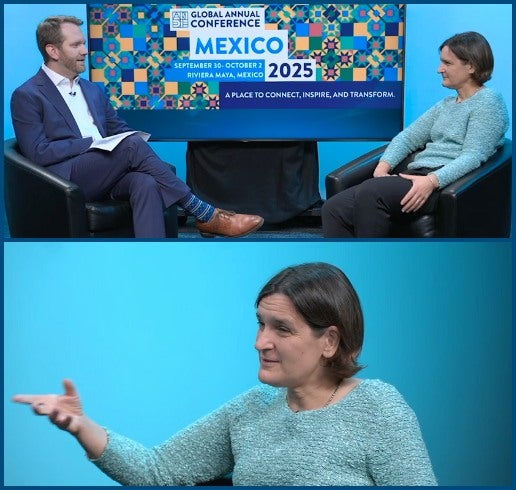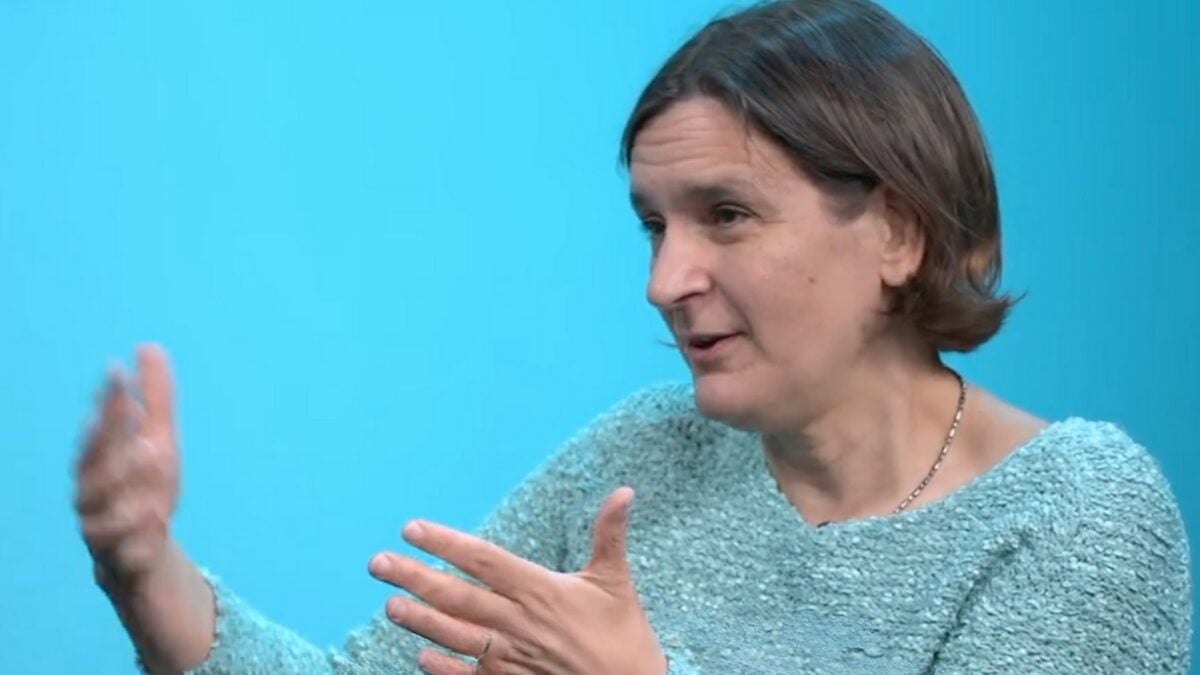Nobel laureate Esther Duflo and ANDE’s Devin Chesney discussed evidence-driven aid, entrepreneurship, and how to scale what truly works. Read or watch here the interview presented during the ANDE Global Annual Conference in Cancún on September 30.
(This interview has been edited for length and clarity. Watch the full conversation in the accompanying video.)

Esther Duflo, Nobel Prize–winning economist and co-founder of the MIT Abdul Latif Jameel Poverty Action Lab (J-PAL), has built her career around a deceptively simple question: what actually works to fight poverty?
Her research has reshaped how policymakers and practitioners think about development, moving from broad theories to evidence-based experimentation and scaling solutions that truly deliver impact.
During the ANDE Global Annual Conference 2025 in Mexico, Duflo joined ANDE Executive Director Devin Chesney for a conversation on the future of aid, the role of entrepreneurship, and how rigorous evidence can drive smarter development.
Q: Many of us in the ANDE network focus on entrepreneurship as a pathway to inclusive growth. You chose to dedicate your career to poverty reduction very early on. Where did that motivation come from?
Esther Duflo: It goes back to my childhood. I grew up in France in a middle-class family. My mother was a doctor who volunteered with an NGO supporting child victims of war. Seeing those realities left me with what I call a “cosmic debt”—a sense that I had to justify the luck of being born where and when I was.
After some detours, I found my place in economics, and later in building J-PAL. For more than two decades, we’ve been testing thousands of ideas to see what truly reduces poverty—and scaling the ones that do.
Q: Development organizations have faced major funding cuts, including from USAID. What impact does this have on the fight against poverty?
Duflo: It’s a tragedy. Agencies such as USAID, Gavi, or PEPFAR have played essential roles in saving lives through vaccination and disease prevention. Nobody has stepped in to fill those gaps, and the consequences are severe—children are dying of hunger and preventable illness.
At the same time, we must remember that aid budgets are small compared to what governments spend. That’s why aid should focus on areas where it adds the most value: responding to crises, funding global public goods like pandemic preparedness and climate action, and investing in policy innovation.
I often describe this as “venture capital for policy”—testing bold ideas, accepting that many will fail, but scaling those that work.
Q: Can you share an example of this “venture capital for policy” approach in action?
Duflo: One study we ran looked at women working in Indian textile factories. Many were hesitant to speak up when problems arose, which hurt both morale and productivity. A simple soft-skills training program helped them communicate more effectively.
The result was remarkable: higher productivity, lower turnover, and greater confidence among workers. It was inexpensive and easy to replicate—proof that sometimes small, well-designed interventions can have outsized effects.
 Q: What role does entrepreneurship play in the larger effort to reduce poverty?
Q: What role does entrepreneurship play in the larger effort to reduce poverty?
Duflo: Most people don’t aspire to be entrepreneurs—they want stable, dignified jobs. But entrepreneurship remains a vital pathway, particularly where formal employment is scarce.
The goal should be to help small firms become medium-sized enterprises that can sustain growth, create stable employment, and integrate into global markets. Export-oriented firms, or those that adopt better management and invest in their workers, are the ones that generate lasting prosperity.
Q: Your work emphasizes experimentation and evidence. How do you encourage leaders to accept findings that challenge their assumptions?
Duflo: It requires an entrepreneurial mindset. If your goal is to look good to funders, you’ll avoid hard evidence. But if your goal is real impact, you must be ready to fail.
Most of what I test doesn’t work—and that’s fine. The successes, when scaled, can change millions of lives. Evidence is not about confirming what we believe; it’s about discovering what actually makes a difference.
Duflo’s reflections underscore a shared principle across ANDE’s global network: progress depends on curiosity, experimentation, and the courage to learn from failure.
Her call to action for policymakers and entrepreneurs alike is clear: test boldly, scale wisely, and stay grounded in evidence.
In an era of shrinking aid budgets and expanding local innovation, building the future of development may depend less on ideology—and more on the disciplined pursuit of what works.
Interested in ecosystem transformation and not an ANDE member? Learn more about the benefits of membership. Subscribe to ANDE’s newsletter for updates on the agenda, speakers, and registration for the Global Annual Conference 2025.






